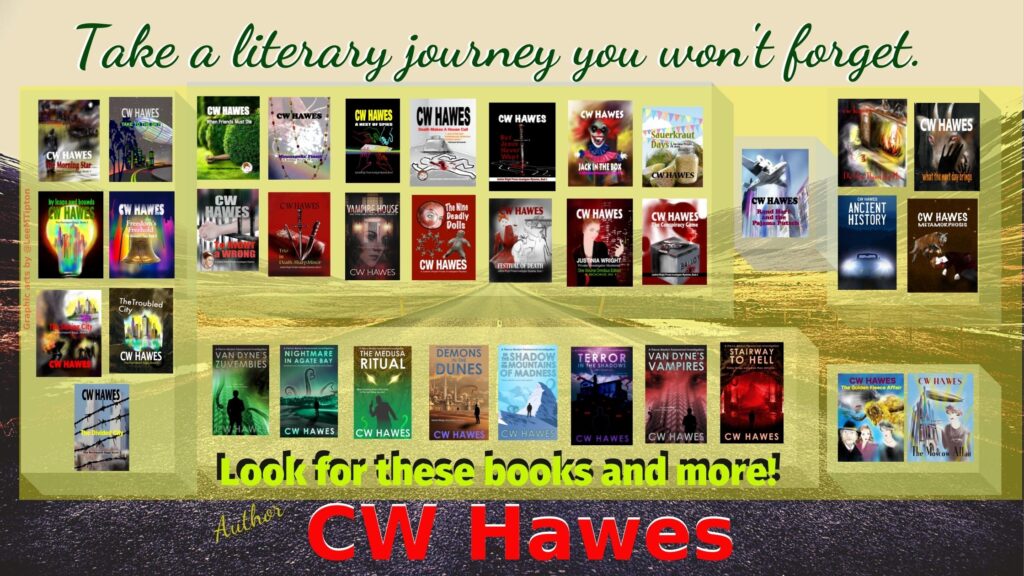It is difficult to believe I published my first four books eight years ago. November 8, 2014.
It’s been a wild ride. I’ve watched excellent writers get discouraged and quit. I’ve watched mediocre writers become millionaires. I’ve watched good writers continue to endure, hoping for a break.
For myself, I have come to the realization this gig is basically a hobby. I’m not going to get rich and probably won’t be able to buy that Rolls Royce I’ve always wanted.
I can’t write fast enough to put out a book a month. And that’s pretty much a necessity, if you want to hit the big time and stay there in the indie world.
I don’t have the money to launch massive ad campaigns, nor the know-how to fudge the system to get those coveted bestseller rankings.
I don’t care to write in the genres that are hot, where the books simply fly off the shelves. They aren’t my cup of tea. I don’t like to read them, and therefore probably wouldn’t do a good job writing them even if I chose to do so. Then again, quality has nothing to do with marketing.
Given the above, I have been asked, “So why continue? Don’t you have anything better to do?”
The answer to the last question is NO. I do have other things that I can do — but nothing, for me, is better than telling stories.
The first question, why continue, is actually one I have been asking myself of late. Writing and publishing a book it is a lot of work, and it does cost money. Sometimes more than I make from the book.
So why do it?
I do it because I love storytelling.
I’ve always wanted to be a writer. I loved reading as a kid and I wanted to create stories and hopefully give others something of the enjoyment I had received from books.
When I was young, I didn’t write stories like many writers say they did. I told myself stories and sometimes acted them out in my play. Maybe that is why I have always been drawn to acting and drama. It’s probably why I focus on dialogue in my writing and tend to skimp on the description.
Whether vocal or written, storytelling is still storytelling. We tell stories to make us laugh, to make us cry, to encourage us, to give us hope, to allay our fears, and to realize our dreams.
Storytelling does all that for not only the storyteller but also his audience.
So while I am not making much money at this gig, I am getting paid in something other than money.
Whenever I read a good review or tweet about one of my books I know that I have touched someone’s heart. I have given someone a bit of joy to help them make it through their day. And that makes me just a little bit richer.
But the indie publishing scene is changing. Many authors have decided to take even more control of their work. They are moving away from Amazon.
There is an increase in the number of writers moving away from being exclusive with Amazon, in order to offer their books to readers through a multitude of vendors.
A growing number of writers are focusing on selling from their websites and to the members of their Patreon channels.
Others are using Kickstarter to bring in needed funds and to reach new readers.
I myself I am moving more and more away from Amazon. I no longer directly search for books on Amazon. Because when I do — half of my search results are sponsored ads. And most have nothing to do with what I am searching for.
Now I search for books using Google. Although ads are on the increase with Google. If the ad situation on Google gets to be too much, I will have to start using my Brave browser instead.
As more and more authors realize the odds of readers finding their book among the 7+ million books on Amazon, they are going to start to search for other options, other avenues to get their books in front of potential readers.
And I am right there with them. Amazon hasn’t treated me badly. Quite the contrary. However, when I search for my own books and can’t find them in the first three pages of search results — then I know no one will find them doing a general search.
People don’t like to click and they don’t like to scroll. They want what they’re looking for right there in front of their face without having to bother scrolling or clicking. And if my book isn’t on page 1 of the search results — for all intents and purposes it doesn’t exist.
I am not sure what the new year will bring. I am not going to give up writing. But traditional publishing and the standard indie route (which isn’t all that different from traditional publishing) is simply too crowded. It takes money and savvy marketing to get a break and I have neither the cash nor the skills.
So I will be looking for new avenues to try to get my books before the eyes of potential readers. What they are, I don’t know. At least not yet. NFTs? Maybe. Kickstarter? Maybe. Push hard to collect fans on my mailing list? Maybe. YouTube? Maybe.
If you like my books, please spread the word. Because word-of-mouth is the best advertising. Thanks!
For now, you can find all of my books on Amazon.
Comments are always welcome! And until next time, happy reading!
 CW Hawes is a playwright, award-winning poet, and a fictioneer, with a bestselling novel. He’s also an armchair philosopher, political theorist, social commentator, and traveler. He loves a good cup of tea and agrees that everything’s better with pizza.
CW Hawes is a playwright, award-winning poet, and a fictioneer, with a bestselling novel. He’s also an armchair philosopher, political theorist, social commentator, and traveler. He loves a good cup of tea and agrees that everything’s better with pizza.
If you enjoyed this post, please consider buying me a cup of tea. Thanks! PayPal.me/CWHawes
Share This!
